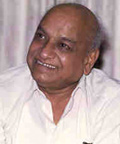
A NATION OF MINORITIES !
Author - VT Joshi

|
A NATION OF MINORITIES !
|
"YOU HINDUS are very lucky", remarked the bearded Maulana when I called on him in Islamabad way back in the late 1980s'. Stunned by his strange opening remark to greet a visiting stranger, I politely asked him why he thought so and what was wrong with Muslims.
"No", he sighed. Explaining his puzzling observation he bemoaned: "Muslims of the subcontinent are divided into three parts. But Hindus have remained intact (in one country)." His discomfiture was painfully visible. The Maulana, in colourful turban and full grown black flowing beard (now all grey), was none other than Fazl-ur-Rehman, Chief of JUI (Jamaati ulema Islami), one of Pakistan's prominent fanatically fundamentalist outfits in the vanguard of the Jehadi movement.
I was reminded of that conversation by a recent panel discussion on Pakistan Television in which three distinguished Pak nationals participated-- Mehdi Masood, Mohammad Askari, both former diplomats, and ex-brigadier Siddiqui. In the context of the recent happenings one of them felt that in retrospect the Gujarat carnage after the Godhra inferno furnished ample justification for the partition of India, almost a "providential" event for the "safety" of Muslims. Even after half a century many Pakistani intellectuals constantly try to find justification for the partition out of a sense of injured innocence.
Brigadier Siddiqui however sounded a note of caution, beseeching that the gruesome happenings should not be seen as Hindu-Muslim conflagration but essentially only as a matter of "Majority-Minority" impasse. He pointed out that Muslims in India are Indian citizens though they are a large, indeed a "major" minority. What was not said in so many words but was obvious, was that likewise Hindus, Christians, Ahmedias, and Parsees in Pakistan are all Pakistani citizens (though admittedly in a hopeless, helpless, voiceless minority).
Mr. Askari, who has had a long diplomatic stint in the Pakistan High Commission in Delhi, noted with a modicum of satisfaction that while Gujarat burnt there were no repercussions in the rest of India which was quiet, and appreciated the role of NGOs and the media in containing the flames. He was however worried that the Indian youths appeared to be inclined more and more towards the "Hindutva philosophy". Mehdi Masood, a former ambassador, graciously appreciated the writings of Indian columnists and named a few, notably Kuldip Nayar and Praful Bidwai. The general tone and tenor of the discussion was however disconcerting from the Indian point of view.
What however was hardly elaborated in the PTV discussion was Brigadier Siddiqui's passing reference to the majority-minority concept of the conflict in India, instead of regarding it as Hindu-Muslim impasse. Nonetheless it deserves to be examined critically and dispassionately. It is a myth that India is a large monolith of Hindu majority with an oppressed minority. In fact India is a nation of minorities in which every community has managed to feel oppressed by the other. The latest to join the minority tribes is the wealthy and well advanced Jain community which has been officially accorded "minority status" by the Congress government in Madhya Pradesh obviously influenced by the curse of vote politics.
"Alienation" is a popular term, rather a misnomer, in the Indian political lexicon. It has become fashionable to use the term indiscriminately in relation to the border regions but it is no less relevant to other parts. In essence it is the politics of poverty, mass poverty, partly because of imbalanced economic growth and VIP oriented governance. Through countless castes and subcastes and a multiplicity of deities, languages and dialects, living styles and varied climate and culture, India is a conglomeration of minorities - justly proud, though, of its prized ideal: "unity in diversity". Present day secular politics, both of the genuine and pseudo variety, takes comfort in this ideal while it simultaneously indulges in rabble rousing. Communal politicos regard diversity as their bugbear.
Ironical and incredible as it may seem, if anything it is the large Indian Muslim community which, by virtue of its numbers and unity, is virtually a majority in a sea of minorities, as it were. Though "truncated" into three parts after the partition, as Maulana Fazl-ur-Rehman bitterly rued, the community has gained an upper hand in the numbers game of electoral politics with which democracy has come to be equated over the years in India. The noble political creed of Islam seems to be going far in the power politics of the nation of minorities.
VT Joshi
26th August, 2002

VT JOSHI (1925-2008) worked for more than fifty years as a journalist. He retired from THE TIMES OF INDIA in 1989. During 1985-89 he was the Special Correspondent of THE TIMES OF INDIA in Pakistan. His books "PAKISTAN: ZIA TO BENAZIR" and "INDIA AT CROSS ROADS" (co-author GG Puri) were widely reviewed in both India and Pakistan.

Website developed and managed by

MF-104, Ajay Towers, E5/1 (Commercial),
Arera Colony,
Bhopal - 462016 INDIA

© All Rights Free